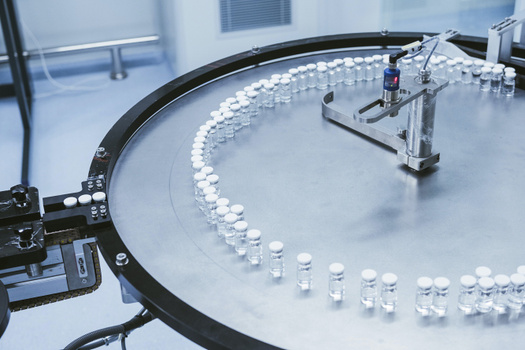
Drug money In 2011, the Russian government launched a multibillion-dollar gambit to strengthen the country’s pharmaceutical industry. Ten years later, it’s led to a wave of arrests — and not much else.
Мы говорим как есть не только про политику. Скачайте приложение.
In mid-March, Moscow’s Basmanny District Court arrested International Olympic Committee Executive Board member Alexey Vlasenko based on testimony from two previously detained businessmen. Two months later, the same court arrested Russian Industry and Trade Ministry deputy head Olga Pokidisheva and former head Olga Kolotilova on suspicion of fraud. The common thread between these people is Pharma 2020, a federal targeted program designed to import new medical technology into Russia that has brought just four medications to market, so far. Meduza special correspondents Svetlana Reiter and Ivan Golunov explain what happened when the Russian government decided to play venture capitalist.
An Olympic athlete in prison
Fifty-six-year-old Alexey Vlasenko, a member of the International Olympic Committee’s Executive Board and a former European swimming champion, has spent the last three months in Moscow’s Pre-Trial Detention Center Number 4 (SIZO-4), informally known as “The Bear.” He stands accused of large-scale fraud, which carries a sentence of up to 10 years in prison.
As late as March, Vlasenko was hoping to be released in time to attend the Tokyo Olympics, after which he promised to return to the detention center. When human rights activist Marina Litvinovich, who was a member of Moscow’s Public Monitoring Commission (ONK) until recently, visited Vlasenko in prison, he told her his arrest “could negatively impact the Russian teams’ performances.”
A temporary release seemed possible in part because Vlasenko heads three major Russian sports federations: the Synchronized Swimming Federation, the Diving Federation, and the Water Polo Federation. The odds, however, aren’t looking good — investigators recently extended his sentence until mid-June. Vlasenko’s lawyer, Sergey Prezhembsky, declined to speak with Meduza.
Three sources familiar with the investigation say police arrested Vlasenko after Vladimir Zubkov (a former shareholder of the now-bankrupt agroholding company OGO) and his friend Vladimir Novakovsky (both executives of a little-known pharmaceutical company called Pharmdiscovery) filed a petition for his arrest. Both men were taken into custody last fall, also on charges of large-scale fraud. According to publicly available documents on the Moscow City Court’s website, both men struck deals with investigators.
Zubkov and Novakovsky founded Pharmdiscovery in 2013. By 2014, the company had received 450 million rubles ($6.2 million) from the Industry and Trade Ministry (also known as “Minpromtorg”). Pharmdiscovery was slated to bring three new drugs to market: Eventa, an antipsychotic medicine; Neotranquil, an anti-anxiety medicine; and Kvastil, an anti-epileptic medicine.
It’s clear from the men’s testimonies that Vlasenko helped them secure the agreements for these transfers as part of the federal program Pharma 2020, and, according to sources close to the investigation, this was done through the Industry and Trade Ministry’s Department of Pharmaceutical and Medical Industry Development (which both Kolotilova and Pokidysheva have led at various times).
“These are all persons of interest in the same case, and investigators are focusing on one thing: they suspect the pharmaceutical contracts were being used as a cover to steal money. Zubkov and Novakovsky themselves claim to have been working at Vlasenko’s behest,” said Sergey Bizyukin, Olga Kolotilova’s lawyer. She declined to comment further.
“Vlasenko would walk into Minpromtorg like he owned the place. He knew everyone, and he’d get his investor friends in on deals. And all because he’s loved swimming since he was small — just like Industry and Trade Minister Denis Manturov, according a source familiar with the details of the investigation.
In addition to being Russia’s industry and trade minister, Manturov also heads the All-Russian Swimming Federation’s supervisory committee, where Vlasenko is a member. In a 2017 speech at a United Russia meeting, Manturov described his desire to create a single association of Russian water sports that would include the Synchronized Swimming Federation, the Diving Federation, and the Water Polo Federation — the same federations led by Alexey Vlasenko, who counted on heading the unified association (before he was arrested).
A source who recently left the Industry and Trade Ministry confirmed to Meduza that Vlasenko often showed up at the Ministry and seemed to know Olga Kolotilova well. “Vlasenko was a lobbyist, and he would come to Minpromtorg for advice,” said a source who worked in the same department as Kolotilova and Pokidysheva.
Meduza’s correspondent reached out to the officials themselves, a week before their arrest. They declined to comment on the situation. The Pharmdiscovery executives’ lawyers also declined to speak to Meduza. “We have no comment on this topic,” a representative of the Central Office of Russia’s Federal Investigative Committee said. The Industry and Trade Ministry didn’t respond to Meduza’s requests for comment, either.
A government start-up
Technology transfers made up a relatively small part of Pharma 2020, which has cost the government more than 7 billion rubles ($96 million) over the course of its existence. The program is the federal government’s attempt to bring new medications to the Russian market by acting as a kind of giant venture capitalist.
“The idea for the program came about when innovation fanatic Dmitry Medvedev was still the Russian president and everyone was getting into venture investments. Private capital didn’t want this one, so the government stepped in,” a source from a major pharmaceutical company told Meduza, explaining that this is the reason why trendy words like “innovation” and “technology transfer” started appearing within the program.
According to other market participants, one of the many parties lobbying for the transfer of technology to Pharma 2020 was a company called ChemRar, which had been trying to promote a similar program independently.
Buy, test, sell
Chemist Alexander Ivashchenko and his son Andrey founded ChemRar back in the 1990s. According to a source close to the company’s leadership, the founders’ initial idea was to sell Soviet medical technology to Western companies. “Ivashchenko wanted to create a library of Soviet-developed molecules for Big Pharma, but it didn’t work out because none of the Soviet molecules interested anyone from Western Pharma.
So ChemRar changed course. In the last 2000s, representatives from the company approached Russian research institutes with a new proposition. ChemRar would buy the rights to foreign medications still in the early stages of clinical trials, conduct its own clinical trials in Russia, then the drugs could be sold to Western pharmaceutical companies.
“Not even Chubais appreciated the idea because everyone knew there could be difficulties if the medications didn’t pass all stages of their trials. So after that, ChemRar started going after the Industry and Trade Ministry with its Pharma 2020 strategy,” said a source who examined ChemRar’s proposals for one of the research institutes.
After learning about Pharma 2020’s concept development, ChemRar’s founders resolved to see their ideas included in the program. “They got in touch with industry representatives, surveyed them about Pharma 2020, filled out the necessary paperwork, and brought it to us — it became their main objective,” said a former Industry and Trade Ministry official. Meduza reached out to ChemRar with questions, but spokespeople declined to comment.
Ultimately, ChemRar’s Chemical Diversity Research Institute won the Industry and Trade Ministry’s tender to develop Pharma 2020’s general strategy.
In 2010, then-Industry and Trade Minister Viktor Khristenko pitched the plan to then-Prime Minister Vladimir Putin during a presentation at ChemRar’s Khimki office. Khristenko told him that due to the economic crisis, foreign companies were starting to examine their technology portfolios and set some aside as part of their consolidation efforts, either because of a lack of resources or lack of time. And Russian companies could use this technology.
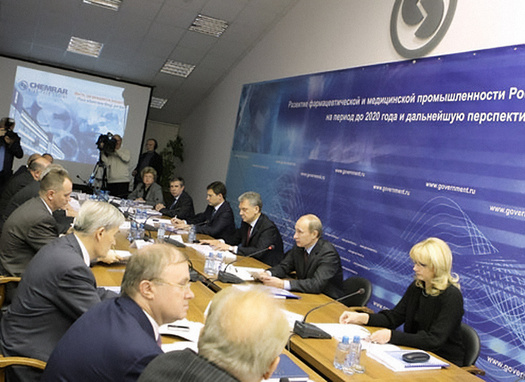
After the program’s approval, ChemRar was given several government contracts to develop technical requirements and drug-transfer technology, receiving 135 million rubles ($1.85 million), and its subsidiaries were paid 29.4 million rubles ($403,000) for supervising Pharma 2020’s implementation.
And that’s how the people behind ChemRar became Pharma 2020’s main ideologues, its overseers, and the largest beneficiaries of its technology-transfer grants, ultimately signing 13 contracts with the Industry and Trade Ministry for a total of about 1.9 billion rubles ($26 million).
They can’t all be winners
Getting a contract for technology transfers from the Industry and Trade Ministry turned out to be a piece of cake — and the terms were great.
The Pharma 2020 contract allowed for 57 new foreign medications that still hadn’t completed their clinical trials abroad to be released in Russia by 2020. Because the trials weren’t finished, the medications were relatively cheap.
To achieve this, the government, in the form of the Industry and Trade Ministry, awarded grants to everyone who wanted them, paying an average of 150 million rubles ($2 million) per medication. The program also provided for co-financing from private companies, which received government grants worth at least 25 percent of a drug’s research-and-development costs.
The contracts required that the medications go through clinical trials but there was a catch: the drugs didn’t need to be released on the market. This was lucky for Pharmdiscovery executives Zubkov and Novakovsky, whose drugs were accepted by the Industry and Trade Ministry, as confirmed by Russia’s public procurement website, but never went on sale.
The rules were established that way because officials knew from the start that some medications might not succeed, a former Industry and Trade Minister employee told Meduza. “But the money was coming from the government, and we knew the transfer would still be good for our scientists. They’d be able to touch the molecules themselves and do research for future medications.”
The projects for the technology-transfer program were chosen by a scientific council led by microbiologist Alexander Gintsburg, director of the Gamaleya Research Institute of Epidemiology and Microbiology, where the Sputnik V vaccine was developed. One of the council members, biologist Alexander Shtil, told Meduza that the group was periodically brought unworkable projects. Sometimes they rejected the ideas, but they also “allowed for some risk-taking,” as well.
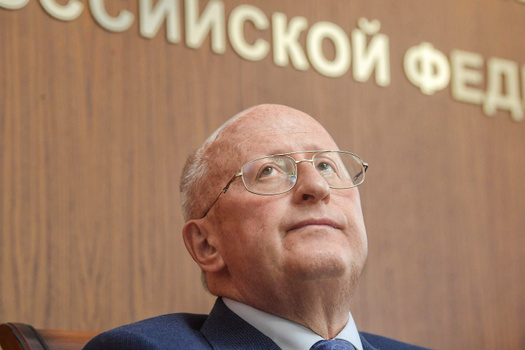
Shtil says the Industry and Trade Ministry urged all of the grantees to report some kind of result; whenever grantees tried to break their contracts, claiming that the drugs had failed to achieve the desired results in clinical trials, Ministry representatives would ask them to keep working. “The Ministry would say, ‘That’s not desirable. Try your best to refine it,’” says Shtil.
The program also included medication that Shtil himself worked on; medication developed by Niarmedik, a company founded by another Gamaleya Institute scientist; and two medications developed by Bioklinikum, a company that belongs to one of the scientific council members, biologist Alexander Tonevitsky. Shtil, however, doesn’t see this as a conflict of interest. “Obviously, there were lawyers keeping an eye on the fact that there were projects from the Gamaleya Institute, and that I was participating in medication development while simultaneously serving on the scientific commission,” he said.
Shtil says Industry and Trade Ministry deputy head Sergey Tsyb stated at the technology-transfer meetings that, as long as 10 percent of the 57 medications made it to market, the experiment would be a success and the costs would be covered.
A celebrity doctor and a Boston millionaire
Meduza spoke with the directors of two companies typical of those that received government grants to import pharmaceutical technology.
Therapist and pediatrician Boris Krugly met Meduza’s correspondent in a mostly empty office on Dubinskaya Street in Moscow. Next door was a pharmacy kiosk with a sign that said “Lina M.”
That’s also the name of one of the pharmaceutical companies that received a government grant to develop a medication for Pharma 2020 — a company that belongs to Boris Krugly. Adik, a second company with connections to Krugly, was also part of the program.
The brother of Oryol Governor Vladimir Krugly, Boris Krugly claims to be disgraced actor Mikhail Efremov’s attending physician, and he eagerly tells stories about treating Efremov himself, his wife, and his kids. That’s how Krugly managed to test Triavir (a COVID-prevention spray he invented himself) on the actor; according to Krugly, it really worked. Now the medication is being sold in the Lina M. office; some people from the trade association had some questions, but the drug was registered, nonetheless.
Krugly also says he treated two executives several years ago from the Moscow-based company group SkyGrad named Yuri Sobol and Alexey Abramov.
“We were rare-earth experts in the Industry Ministry, and we heard about the medical program from the newspapers. We told Boris, ‘You’re a talented person, a sophisticated person. Come on, let’s make some medicine. You’re full of ideas,’” Sobol himself told Meduza. “For two prospective medications — an antidiabetic drug called ‘Fortelinor’ and two antitumor medications called ‘Teokhlonal’ and ‘Afotid’ — the Industry and Trade Ministry gave us 450 million rubles [$6.2 million].”
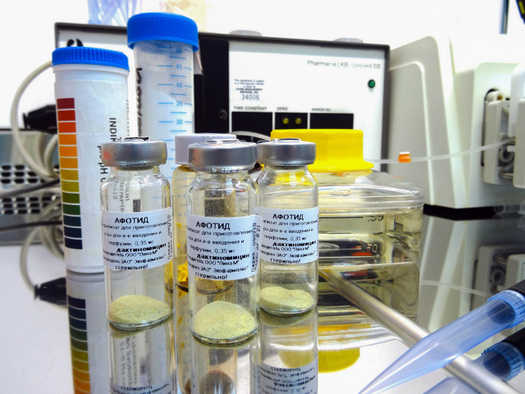
As a co-investor, Skygrad spent another 600 million rubles on the same projects, according to Sobol. “My partner and I were investing in bringing ideas to life. Why would I need to make a profit? I get satisfaction from the process. If we manage to create Afotid, we’ll have made one of the most effective oncology drugs on the market, and my investment will have been worthwhile,” he explained.
To this day, not one of the three medications has appeared on the market, though Krugly promises he’ll start selling Fortelinor at his pharmacies in 2022. In fact, he says it’s already being produced at a drug-manufacturing facility in Serpukhov called EcoPharm Plus.
Russia’s Industry and Trade Ministry has already filed a lawsuit against Krugly’s company for failing to meet its deadline. “We paid 2 million rubles because Afotid’s clinical trials take a long time by definition, so they can’t meet the contract’s deadlines,” Krugly admitted. This is due to the “objective laws of scientific research,” he said, but he maintained that he’s confident all of the medications will eventually be registered and appear on the Russian market.
Elenagen, another drug that never made it to market, was developed by Alexander Shneider, a Soviet immigrant in the United States who called himself “the Boston millionaire.”
The owner of a company called Curelab Oncology, Shneider first tried to collaborate with Russia in 2011 but was unsuccessful. “We registered our company, SL Oncology, in Russia, and quickly became Skolkovo residents, all without a hitch. But they wouldn’t give us a grant, and they obstructed us so much and in such rude and humiliating ways that I decided I wouldn’t do business in Russia anymore,” said Shneider. (A foundation representative confirmed to Meduza that SL Oncology is a former Skolkovo resident but declined to answer any other questions.)
Later on, however, Shneider learned about Pharma 2020 and broke his vow. “You know, I’m a practicing Jew. And before I submitted my documents to Minpromtorg, I thought, maybe God didn’t want me to get distracted from my project at Skolkovo. Looking back now, I want to give their asses a kiss for not giving me money because my project could have gone under,” he said.
The Industry and Trade Ministry allocated 147 million rubles ($2 million) for Elenagen’s clinical trials — the same amount spent by SL-Oncology-co-owner City Development Foundation, a now-liquidated subsidiary of the state development corporation VEB. For the transfer, Shneider used his own American patent for Elenagen. “Of course, I transferred my own technology — who else’s could I have transferred? I have patents in 20 countries. We have the best patent protection in the world,” Schneider told Meduza’s correspondent.
The Industry and Trade Ministry tried to sue Shneider for missing the clinical trial deadline, but it lost the suit. Schneider insists that Elenagen has already been tested on rodents and tumor models and that human trials are taking place in Belarus. He plans to start clinical trials of the medication in the U.S. in 2022. Whether the drug will ever reach the Russian market is unclear.
Small victories
The project hasn’t been all failures — there are three medications on the Russian market right now that came out of Pharma 2020. Officially, there are four, but Meduza was unable to find evidence of the fourth being sold anywhere.
Pharma 2020’s undisputed champion is ChemRar’s Elpida, an antiretroviral therapy used to treat HIV. According to Russia’s public procurement website, Russian medical facilities purchased 3.2 billion rubles ($44 million) of this medication between 2017 and 2021.
That the medication was included in the project at all raises questions, however. In 2009, ChemRar bought an HIV medication with the working title VM-1500 for $5 million from the Swiss pharmaceutical company Roche. In late 2011, after the Pharma 2020 program was approved, a company created by the ChemRar group called Viriom received 150 million rubles ($2 million) for technology transfer and conducting clinical trials. The Skolkovo Foundation contributed another 149 million rubles ($2 million).
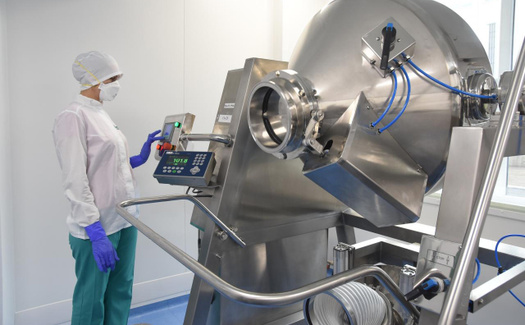
In the summer of 2018, production of Elpida began at a Kursk facility owned by a holding company called Pharmstandard registered to a man named Viktor Kharitonin. Soon after, Russia’s Health Ministry added the medication to its Vital and Essential Drugs List (ZhNVLP). In 2019, Pharmstandard became a co-owner of the medication developer Viriom; 30 percent became the property of Pharmstandard, while the 44 percent of the company that belonged to ChemRar was pledged as collateral. According to the company’s financial records, Viriom made 553.7 million rubles ($7.6 million) in royalties in 2020 from sales of Elpida.
Fifty-three of the medications for which Pharma 2020 issued grants, however, never made it to market. After ChemRar, the next company to receive technology-transfer funding from the government was Generium, a company founded by Pharmstandard owner Viktor Kharintonin (and co-owned by former Trade and Industry Ministry deputies Andrey Reus and Andrey Dementyev, who each own 12.5 percent of the business). Generium signed seven contracts with the Ministry for a total of 984 million rubles ($13.6 million).
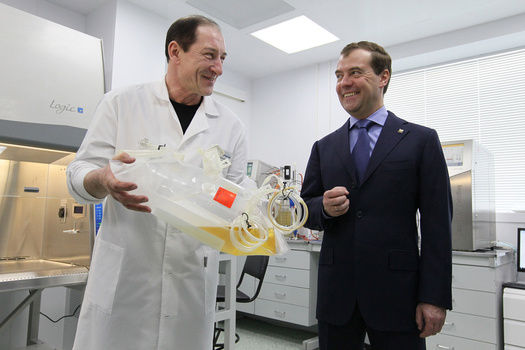
The company’s initial plan was to import hepatitis vaccines, but it ultimately asked for the contract’s termination due to an “inability to achieve results,” explaining that “there wasn’t any information about the [medication’s] efficacy when the transfer was agreed upon.”
The same story repeated with the rest of the technology-transfer contracts, including one for a cancer drug developed by Cuba’s Center for Molecular Biology. Representatives from Generium didn’t respond to Meduza’s request for comment.
Another company, St. Petersburg’s Biokad, signed a contract to import bevacizumab (sold under the brand name Avastin), which is produced by the company F. Hoffmann-La Roche. After receiving only 37.4 million rubles ($517,000) of the agreed-upon 149.8 million rubles ($2.1 million), Biokad terminated the contract, also citing an “inability to achieve results.”
In 2015, however, Biokad registered the medication Averga, which lists bevacizumab as its active ingredient.
“This is toxic money”
Pharma 2020 has been extended to 2024, but Industry and Trade Ministry representatives recently compiled a report on the program’s interim results with an emphasis on its achievements.
According to data from the Ministry, about 40 new pharmaceutical manufacturing facilities were opened in Russia between 2014 and 2020, seven of them built by foreign companies. Additionally, the government alone invested 42.5 billion rubles ($588 million) in the pharmaceutical sector, including 29.2 billion rubles ($404.1 million) for research and development, according to Ministry representatives who spoke to Forbes.
In 2019, the Russian pharmaceutical market’s total volume reached 1.45 trillion rubles ($20.1 billion) — 25.1 percent larger than in 2014. However, the share of Russian medications on the market still hasn’t reached 50 percent, which was Pharma 2020’s goal. The Industry and Trade Ministry officially acknowledged its failure and even floated the idea of lowering its target to 32.9 percent (Russian medications made up 30.8 percent of the market in 2019).
The Health Ministry’s Vital and Essential Drugs faced the same problem: according to DSM Group estimates, Russian medications made up just 58.8 percent of those on the list in 2020 — a far cry from Pharma 2020’s target of 85 percent.
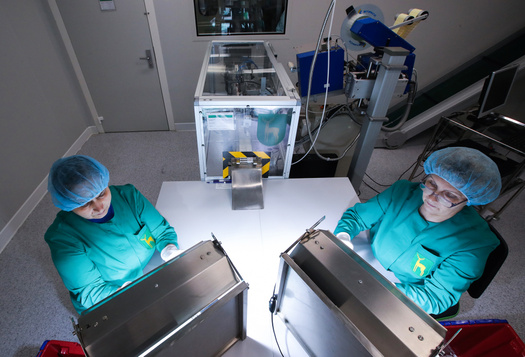
Viewed from this perspective, Pharma 2020’s results start to look more ambiguous. On the one hand, only four of the 57 medications in which the government invested have reached the market. “It was probably a mistake to pour money into this. Sure, the program helped us hone our expertise, led to more manufacturing plans, but something went wrong with the transfers,” a former Industry and Trade Ministry official who helped create Pharma 2020 told Meduza.
But, on the other hand, four successful medications out of the initial 57 is fairly close to the 10-percent threshold that Sergey Tsyb said would make the project a success. And sales of the project’s two most successful medications — Elpida and Arlansa — have already amounted to 4.3 billion rubles ($59.5 million), compared to the 8.24 billion rubles ($114 million) the government spent on technology transfer.
Failure was always an acceptable option, however, at least from a legal standpoint. “You have to understand that Pharma 2020 is a development program — the government provides money for development, for R&D. According to the Civil Code, it’s okay for R&D to end up getting zero results,” insisted a source who participated in the program.
Many of the program’s participants who recently spoke to Meduza, however, admitted to being spooked by the recent arrests — especially because the charges against the defendants are still unclear. Some sources say they worry that a lack of results with most of these drugs could play a role in the prosecutions ahead.
Other sources expressed relief that they didn’t receive Pharma 2020 grants, saying they’ve been suspicious of the programsince its inception.
“Generally speaking, major companies didn’t want to get involved with money the government allocated for innovation,” a pharmaceutical company representative told Meduza. “It’s toxic money, and behind every ruble is a man in uniform who doesn’t understand words like ‘transfer’ or ‘innovation’ — to him, they’re just empty sounds.”
Story by Svetlana Reiter and Ivan Golunov, edited by Valery Igumenov
Abridged translation by Sam Breazeale